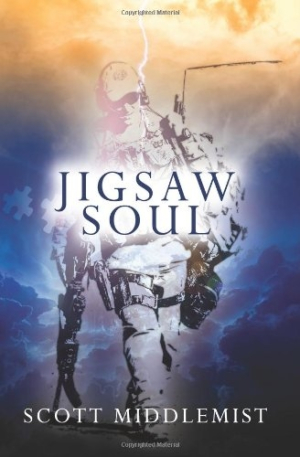
Jigsaw Soul
Scott Middlemist’s debut novel follows Arthur Logan, an Iraq War veteran whose experiences in that war have shoved him out of sanity and into PTSD (post-traumatic stress disorder); every hour, it seems, is weighted with war memories so vivid that Logan thinks they’re actually happening. This effect causes him to make a very dangerous mistake in his civilian life as an air traffic controller, and he is sentenced to a residential psychiatric facility.
Logan has been almost completely consumed by his traumatic past when he enters the psychiatric hospital. With the change of scenery, however, comes a special path that Arthur must follow through his mental landscape, or lose himself and his family forever. Through fantastical means, he learns that his soul has been ripped apart and that his task is to find all the pieces and repair his soul.
Although the novel starts out as contemporary fiction, it smoothly mutates into a fantasy world with an effect similar to the work of Gabriel Garcia Marquez: the miraculous and the impossible happen every day, and the characters seem to expect it. Often termed “magical realism,” this genre can slide toward urban fantasy, war fiction, and any other genre a writer chooses for investigating storylines and character development that would otherwise be nearly impossible.
Middlemist, formerly a US Army infantry officer and currently an English teacher, makes excellent use of his military experiences and expertise to create battles scenes where the reader learns what Logan did during his combat days. These sections are stark and disturbing; civiliansmay prefer not to think of their country’s soldiers as killing machines, but that is what they can become, especially when their unit leader isn’t quite balanced. Logan can’t stand his detachment commander and superior officer, who is nicknamed Medusa, but he also admits that the man is an excellent leader in combat, despite his decidedly dark methods.
Jigsaw Soul is a tightly written, perfectly paced novel of a man’s journey toward reconciliation with himself and his world. A spiritual element pervades but never hijacks the story.
PTSD has been likened to a shattering of the self, and even those who escape the hell of PTSD might experience the thousand-yard stare, the gaze of utter weariness that can presage moral and/or spiritual defeat. Scott Middlemist has brought the causes and effects of PTSD into the light in a meticulous and caring way.
Readers who enjoy combat fiction, fantasy, or allegorical tales should be steered toward this book.
Reviewed by
J. G. Stinson
Disclosure: This article is not an endorsement, but a review. The publisher of this book provided free copies of the book and paid a small fee to have their book reviewed by a professional reviewer. Foreword Reviews and Clarion Reviews make no guarantee that the publisher will receive a positive review. Foreword Magazine, Inc. is disclosing this in accordance with the Federal Trade Commission’s 16 CFR, Part 255.
